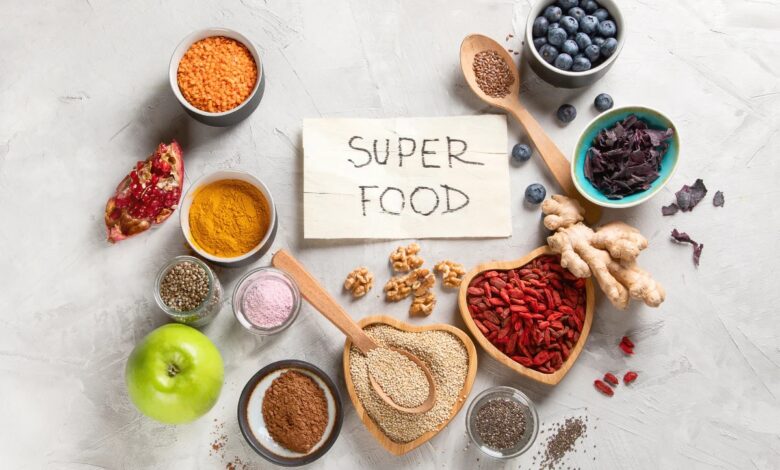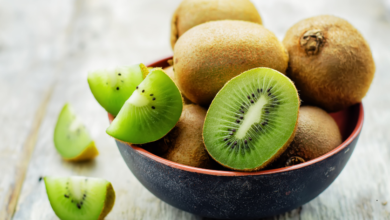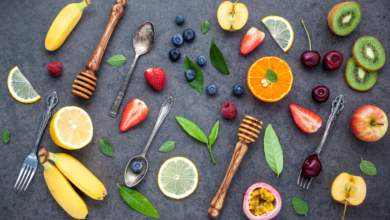Superfoods You Should Add to Your Diet

In recent years, the term “superfood” has gained significant popularity in the wellness world, and for a good reason. Superfoods are nutrient-dense foods that are packed with vitamins, minerals, antioxidants, and other compounds that offer health benefits. Adding superfoods to your diet can help improve overall well-being, boost energy levels, support the immune system, and promote longevity.
If you’re looking to improve your health, it’s important to focus on a balanced and nutrient-rich diet. Superfoods can play an essential role in this by providing your body with the necessary nutrients it needs to thrive. In this article, we’ll dive into some of the top superfoods that you should consider incorporating into your daily meals.
1. Blueberries: The Antioxidant Powerhouse
Blueberries are often referred to as a “superfruit” due to their high antioxidant content. These tiny berries are loaded with anthocyanins, a type of antioxidant that can help reduce oxidative stress and inflammation in the body. Studies have shown that regular consumption of blueberries can improve brain health, enhance memory, and protect against age-related cognitive decline.
In addition to antioxidants, blueberries are also rich in vitamins C and K, fiber, and manganese. These nutrients contribute to boosting immunity, improving skin health, and supporting bone health. Adding blueberries to smoothies, oatmeal, or yogurt can be a delicious and easy way to benefit from their many health-promoting properties.
2. Kale: The Leafy Green Powerhouse
Kale has earned its place as one of the most well-known superfoods, and for a good reason. This leafy green vegetable is packed with vitamins A, C, and K, as well as minerals like calcium, potassium, and magnesium. Kale is also an excellent source of fiber and antioxidants, which can help support digestion and reduce inflammation in the body.
One of the standout benefits of kale is its high content of phytochemicals, including flavonoids and carotenoids. These compounds have been shown to reduce the risk of chronic diseases such as cancer and heart disease. You can enjoy kale in various forms, such as in salads, smoothies, soups, or even as crispy kale chips.
3. Chia Seeds: The Tiny Nutrient-Dense Superfood
Chia seeds are small but mighty when it comes to nutritional benefits. These tiny seeds are packed with fiber, protein, omega-3 fatty acids, and antioxidants. They are also a great source of minerals such as calcium, magnesium, and phosphorus. Chia seeds are particularly known for their ability to absorb water and form a gel-like consistency, which makes them an excellent addition to smoothies, overnight oats, or chia pudding.
One of the key health benefits of chia seeds is their ability to support heart health. The omega-3 fatty acids in chia seeds help reduce inflammation, lower cholesterol levels, and promote healthy blood circulation. Additionally, their high fiber content aids in digestion and helps maintain a healthy weight.
4. Avocados: The Creamy, Nutrient-Packed Fruit
Avocados have become a popular staple in many diets, and for good reason. They are rich in healthy monounsaturated fats, particularly oleic acid, which can help lower bad cholesterol levels and reduce the risk of heart disease. Avocados are also a great source of fiber, vitamins C, E, and K, and folate.
In addition to their heart-healthy fats, avocados are also packed with potassium, which can help regulate blood pressure. The fruit is also known for its anti-inflammatory properties, thanks to compounds like lutein and zeaxanthin. These nutrients help protect the eyes and may reduce the risk of macular degeneration.
Whether you enjoy avocados on toast, in salads, or blended into smoothies, incorporating them into your diet is an easy and delicious way to reap the health benefits.
5. Quinoa: The Protein-Packed Whole Grain
Quinoa is a versatile and nutritious grain that has earned its spot among superfoods. Unlike many other grains, quinoa is a complete protein, meaning it contains all nine essential amino acids that the body cannot produce on its own. This makes quinoa an excellent protein source for vegetarians and vegans.
In addition to protein, quinoa is also a good source of fiber, vitamins B and E, and minerals like magnesium, iron, and zinc. It is gluten-free, making it an ideal alternative for individuals with gluten sensitivities or celiac disease. Quinoa is also known for its ability to help stabilize blood sugar levels, making it a great option for those managing diabetes.
You can enjoy quinoa as a base for salads, a side dish, or even as a breakfast option by combining it with fruits and nuts.
6. Turmeric: The Golden Spice with Powerful Health Benefits
Turmeric, often used in Indian cuisine, is a bright yellow spice that contains an active compound called curcumin. Curcumin has powerful anti-inflammatory and antioxidant properties, making turmeric an excellent addition to a health-focused diet. Studies have shown that curcumin can help reduce the risk of chronic diseases such as heart disease, arthritis, and cancer.
Turmeric is also known for its potential to improve brain health. Some studies suggest that curcumin may increase the levels of brain-derived neurotrophic factor (BDNF), a protein that supports the growth and maintenance of brain cells. To boost the absorption of curcumin, it’s often recommended to combine turmeric with black pepper, which contains piperine, a compound that enhances curcumin’s bioavailability.
You can incorporate turmeric into your diet by adding it to curries, soups, smoothies, or even making a warm turmeric latte known as “golden milk.”
7. Spinach: The Nutrient-Rich Green Vegetable
Spinach is a leafy green vegetable that is a powerhouse of vitamins and minerals. It is rich in vitamin K, which plays a crucial role in bone health, as well as vitamins A and C, which support the immune system. Spinach is also a great source of folate, iron, and magnesium, all of which are important for overall health and energy production.
One of the key benefits of spinach is its high content of antioxidants, including lutein and zeaxanthin, which promote eye health and may reduce the risk of cataracts and age-related macular degeneration. Additionally, spinach is known to support healthy digestion due to its fiber content.
Spinach can be enjoyed raw in salads, blended into smoothies, or cooked into a variety of dishes, including soups, omelets, and stir-fries.
8. Almonds: A Healthy, Crunchy Snack
Almonds are a popular snack for those looking to boost their nutrient intake. These crunchy nuts are rich in healthy fats, protein, and fiber, making them a satisfying and filling option for between meals. Almonds are also packed with vitamins and minerals, including vitamin E, magnesium, and calcium.
One of the standout benefits of almonds is their ability to support heart health. The monounsaturated fats in almonds help lower bad cholesterol levels, while the antioxidants, including vitamin E, protect against oxidative stress and inflammation. Regular consumption of almonds has also been shown to help manage blood sugar levels and support weight management.
You can enjoy almonds on their own as a snack, add them to salads, or sprinkle them over oatmeal or yogurt for a nutritious boost.
9. Sweet Potatoes: A Nutritious Root Vegetable
Sweet potatoes are an excellent source of complex carbohydrates, fiber, and a variety of vitamins and minerals. They are particularly rich in beta-carotene, which the body converts into vitamin A. Vitamin A plays a crucial role in maintaining healthy skin, vision, and immune function.
In addition to vitamin A, sweet potatoes are also a great source of vitamins C and B6, potassium, and manganese. Their high fiber content helps support healthy digestion and maintain stable blood sugar levels. Sweet potatoes are versatile and can be baked, mashed, roasted, or used in soups and stews.
Conclusion
Incorporating superfoods into your diet is an easy and effective way to nourish your body with essential nutrients and promote overall health. From antioxidant-rich blueberries and kale to protein-packed quinoa and chia seeds, these nutrient-dense foods provide a wide array of health benefits. By adding a variety of superfoods to your meals, you can support your immune system, boost energy levels, and reduce the risk of chronic diseases.
Remember, no single food can provide all the nutrients your body needs, so aim for a balanced diet that includes a variety of whole, nutrient-dense foods. By embracing these superfoods, you’ll be taking a big step toward a healthier and more vibrant lifestyle.
Start small by adding one or two of these superfoods to your meals each week, and soon you’ll be enjoying the many benefits they have to offer!



